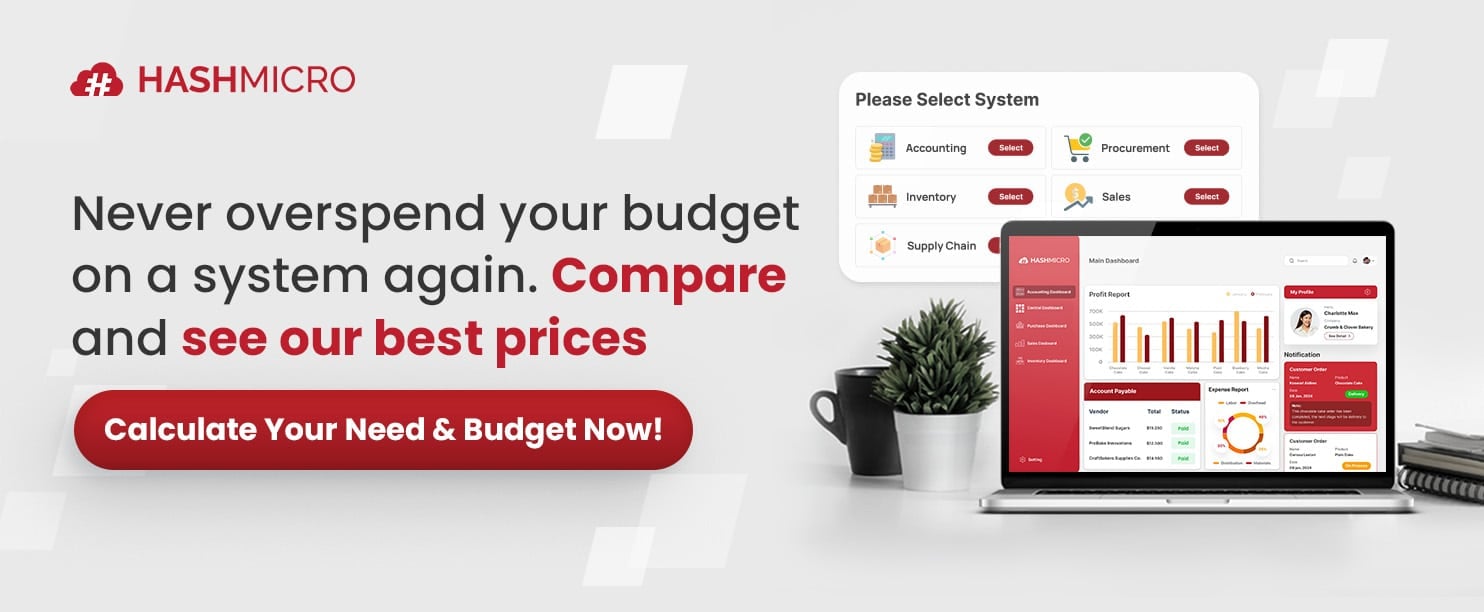Enterprise software is a suite of integrated applications that streamline and manage business processes across an organization. It enhances operational efficiency and decision-making by automating tasks, improving data accuracy, and providing real-time insights.
In Malaysia, the adoption of enterprise software is becoming increasingly essential for businesses aiming to stay competitive in a dynamic market. Studies show that companies using such systems can achieve a 30% increase in productivity.
With the right modules, companies can optimize everything from sales and inventory management to customer relationships and human resources.
This article will delve into the seven must-have enterprise software modules that are crucial for businesses in Malaysia in 2025 where we will explore each module’s functionalities and benefits.
We will also give you several top enterprise software providers in Malaysia as your reference and tips on how to choose the right ERP software for your business.
Table of Content
Content Lists
Key Takeaways
|
What is Enterprise Software?
Enterprise software is a category of applications designed for large organizations, covering a wide range of business functions. Unlike traditional software, it offers comprehensive solutions that integrate operations across finance, HR, sales, supply chain management, CRM, and more.
The primary goal of enterprise software is to improve efficiency and productivity by automating and streamlining complex business processes. This software typically features robust capabilities for data management, enabling real-time insights and analytics that support strategic decision-making.
Additionally, enterprise software is highly customizable and scalable, allowing businesses to adapt it to their specific needs and grow with the organization.
One of the key characteristics of enterprise software is its ability to integrate different systems and applications within a company. This integration helps in breaking down silos, ensuring that data flows seamlessly between departments, and promoting better collaboration and coordination.
For example, ERP (Enterprise Resource Planning) software can integrate accounting, inventory management, and human resources into a single platform, providing a unified view of the business.
Enterprise applications also often include advanced security features to protect sensitive business data. Given the scale at which these systems operate, ensuring data integrity and compliance with regulatory standards is crucial.
Many enterprise software solutions offer role-based access controls, encryption, and audit trails to enhance security and accountability. Moreover, the deployment options for enterprise management software have evolved with technology advancements.
While traditional on-premise solutions are still prevalent, many organizations are adopting cloud-based enterprise software for greater flexibility, scalability, and cost-efficiency. Cloud solutions allow for easier updates and maintenance, remote accessibility, and reduced IT infrastructure costs.
In summary, enterprise business management software is a vital tool for large organizations, offering integrated, scalable, and secure solutions to manage and optimize various business functions, driving efficiency and supporting strategic growth.
Why Businesses in Malaysia Should Implement Enterprise Software?

In today’s competitive business environment, companies in Malaysia face numerous challenges that can hinder growth and efficiency if not addressed effectively.
Enterprise application software, such as ERP systems, provides a comprehensive solution to these challenges, offering significant benefits and transforming business operations.
Problems arise without ERP software
Here are some issues that might happen when companies don’t implement an ERP system:
- Inefficient processes: Without ERP software, businesses often rely on disparate systems and manual processes, leading to inefficiencies and errors. This can result in delayed decision-making, redundant tasks, and decreased productivity.
- Data silos: Businesses without integrated systems often face data silos, leading to inconsistent data, poor collaboration, and difficulties in generating comprehensive reports. According to Gartner, organizations with poor data management can experience up to 40% of their business initiatives failing due to poor data quality.
- Poor financial management: Manual accounting processes are prone to errors and are time-consuming, leading to inaccurate financial reporting and compliance issues.
- Inventory mismanagement: Without proper inventory management systems, businesses struggle with overstocking or stockouts, leading to increased holding costs or lost sales.
Lack of real-time insights: Decision-makers need real-time data for informed decisions.
Without ERP software, accessing current information is difficult, affecting strategic planning and responsiveness.
The positive impact of implementing ERP software
So, what do companies gain from using ERP software? Here are some of the advantages:
- Streamlined operations: ERP software integrates all business processes into a single system, eliminating redundancies and automating routine tasks. This leads to increased efficiency and productivity.
- Enhanced data accuracy and accessibility: ERP systems’ centralized database ensures accurate, consistent data across departments, enhancing collaboration and data-driven decision-making. According to a report by Deloitte, businesses with integrated systems experience a 33% improvement in data accuracy.
- Improved financial management: ERP systems automate accounting, reducing errors and ensuring regulatory compliance, leading to more accurate financial reporting and improved financial health. A study by PwC indicates that companies using ERP software see a 20% reduction in financial process costs.
- Optimized inventory control: ERP systems provide real-time inventory tracking and management, reducing overstock and stockouts. This leads to lower inventory costs and improved customer satisfaction.
- Real-time business insights: ERP systems provide real-time reporting and analytics, allowing businesses to make quick, informed decisions. This leads to improved strategic planning and a competitive edge. According to Panorama Consulting Solutions, businesses report a 30% improvement in their ability to respond to market changes after implementing ERP systems.
To be short, implementing ERP software is crucial for businesses in Malaysia to overcome operational challenges and drive growth. The benefits mentioned above make ERP systems an invaluable asset for any organization.
Must-Have Modules in Enterprise Software

When selecting enterprise software for your business, it’s crucial to ensure it includes the essential modules that cover the core aspects of your operations. Here are the must-have modules you should look for:
Sales
The sales module is vital for managing the entire sales process, from lead generation to closing deals. It helps track customer interactions, manage sales pipelines, generate quotes and invoices, and monitor sales performance.
Key features include sales forecasting, order management, and comprehensive reporting to help you make informed decisions and drive revenue growth.
Accounting
An accounting module is essential for maintaining financial health and ensuring regulatory compliance. It automates financial transactions, manages accounts payable and receivable, processes payroll, and generates financial statements.
Features like real-time financial reporting, budget management, and tax calculation help streamline financial operations and provide insights into your business’s financial status.
Inventory
The inventory module helps manage stock levels, track inventory movements, and ensure optimal stock availability.
Enterprise application also supports functions like inventory tracking, asset management, warehouse management, order fulfilment, and automated replenishment all within the same software.
This module is crucial for avoiding stockouts or overstock situations, reducing carrying costs, and improving overall supply chain efficiency.
Purchasing
The purchasing module streamlines the procurement process by automating purchase orders, supplier management, and procurement planning. It helps manage vendor relationships, track purchase orders, and control procurement costs.
Key features include supplier performance analysis, purchase requisitions, and contract management, ensuring that your purchasing process is efficient and cost-effective.
Manufacturing Management
The manufacturing management module is designed to optimize production processes and ensure efficient resource utilization. It handles production planning, work orders, Bill of Materials (BoM), and shop floor control.
Features like production scheduling, quality control, and machine maintenance tracking help improve manufacturing efficiency, reduce downtime, and ensure product quality.
Customer Relationship Management (CRM)
A CRM module is essential for managing customer interactions, improving customer service, and driving sales growth. It centralizes customer data, tracks customer interactions, and manages leads and opportunities.
Key features include contact management, sales pipeline tracking, customer segmentation, and marketing automation, which help build stronger customer relationships and increase customer satisfaction.
Human Resources (HR)
The HR module helps manage employee information, streamline HR processes, and enhance workforce management. It covers functions like employee records, attendance tracking, payroll processing, performance evaluations, and leave management.
Features such as recruitment management, employee self-service portals, and training and development tools help improve HR efficiency and employee engagement.
Check our article about Malaysia’s top HR software providers if you want to find partial HR solutions.
By ensuring that your enterprise software includes these must-have modules, you can streamline your business operations, improve efficiency, and support growth across various departments.
All these modules are supposed to be customizable to cater specific each business-specific needs. Investing in custom enterprise software development can significantly enhance your business’s efficiency by providing tailored solutions that meet your specific operational needs.
Read Also: Top HR Software for Business – Explore the best software options available this year and find the right fit for your business needs.
5 Best Enterprise Software Vendors for Businesses in Malaysia
Having explored the essential modules that make an ERP system indispensable for any business, it’s clear how these functionalities can transform operations and drive growth. Now, let’s take a look at some of the ERP software in Malaysia that offer these critical modules and more.
1. HashMicro ERP System
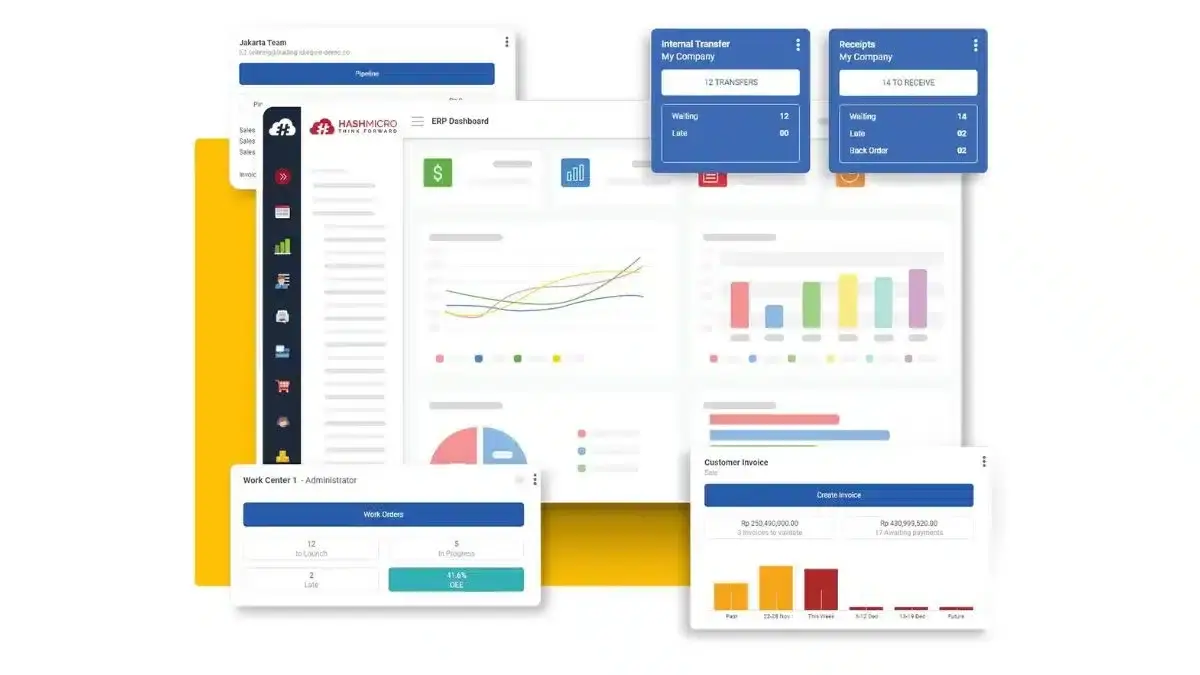
HashMicro is a robust Cloud ERP software solution designed to streamline and automate various business processes for medium to large enterprises. The software integrates multiple business functions, including finance, inventory, sales, human resources, and manufacturing, into a unified platform.
This vendor provides free demo access for prospective clients so they can explore more about the features and modules available before committing.
Known for its flexibility and customization options, with the addition of no limitation for the number of users, HashMicro helps businesses enhance efficiency, reduce operational costs, and achieve better decision-making through real-time data insights.
Key features:
- Finance and accounting: Comprehensive financial management, real-time reporting, and automated invoicing.
- Inventory management: Advanced stock control, automated reordering, and multi-warehouse support.
- Sales and CRM: Sales tracking, customer relationship management, and sales forecasting.
- Human resources: Employee management, payroll processing, and performance tracking.
- Manufacturing: Production planning, work order management, and Bill of Materials (BoM).
- Procurement: Supplier management, purchase orders, and procurement analytics.
- Project management: Task management, project tracking, and resource allocation.
- POS system: Integrated point-of-sale system with real-time sales data and inventory synchronization.
Strengths:
- Customizability: Highly customizable to meet specific business needs, ensuring a tailored fit for diverse industries.
- Comprehensive integration: Seamlessly integrates various business functions, providing a holistic view of operations.
- User-friendly interface: Intuitive design that enhances user experience and reduces the learning curve.
- Scalable solution: Suitable for growing businesses, with modules that can be added as needed to support expansion.
Weaknesses:
- Implementation period: The time spent for implementation might vary depending on how many and how complex the features are needed by the business.
Unlock your business’s potential with HashMicro ERP software, the all-in-one solution for streamlined operations. Seamlessly integrate finance, inventory, HR, and customer management into one platform. Experience how HashMicro ERP can transform and grow your business. Click the price planning banner now to explore affordable and powerful ERP solutions.
2. Odoo ERP Software
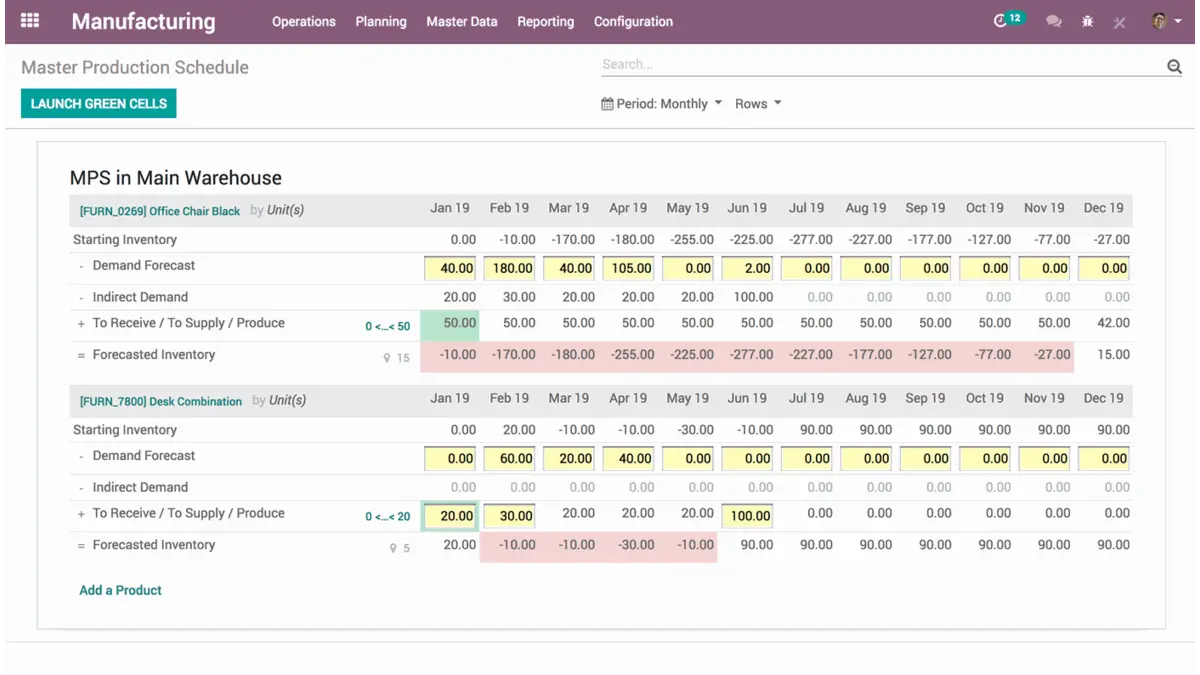
Odoo ERP is a comprehensive suite of open-source business applications designed to manage and streamline various business operations. It caters to businesses of all sizes, providing a modular approach to integrating different functions from sales to HR.
This software’s user-friendly interface and customizable modules make it a flexible and scalable solution for companies looking to optimize their workflows and enhance productivity.
Key features:
- Modular structure: Over 30 main applications that can be deployed individually or as a suite.
- Accounting: Real-time accounting, financial reporting, and automated invoice generation.
- Inventory management: Advanced inventory tracking, automatic replenishment, and warehouse management.
- Sales management: Integrated CRM, sales orders, and customer portal.
- Manufacturing: Bill of Materials (BoM), work orders, and production planning.
- Human resources: Employee records, leave management, and payroll processing.
- Project management: Task management, timesheets, and project analytics.
Strengths:
- Modular flexibility: Businesses can start with basic modules and add more as they grow, ensuring cost-effective scalability.
- User-friendly interface: Intuitive design and easy navigation enhance user adoption and minimize training time.
- Open source: Offers a high degree of customization and integration capabilities, supported by a large community of developers.
- Comprehensive suite: Covers a wide range of business functions, providing an all-in-one solution.
Weaknesses:
- Complex implementation: The initial setup and customization can be complex and time-consuming, often requiring expert support.
- Performance issues: Some users report slow performance and system lags, especially with large data volumes.
- Cost of customization: While the base software is affordable, extensive customization and third-party integrations can become costly.
3. Oracle NetSuite
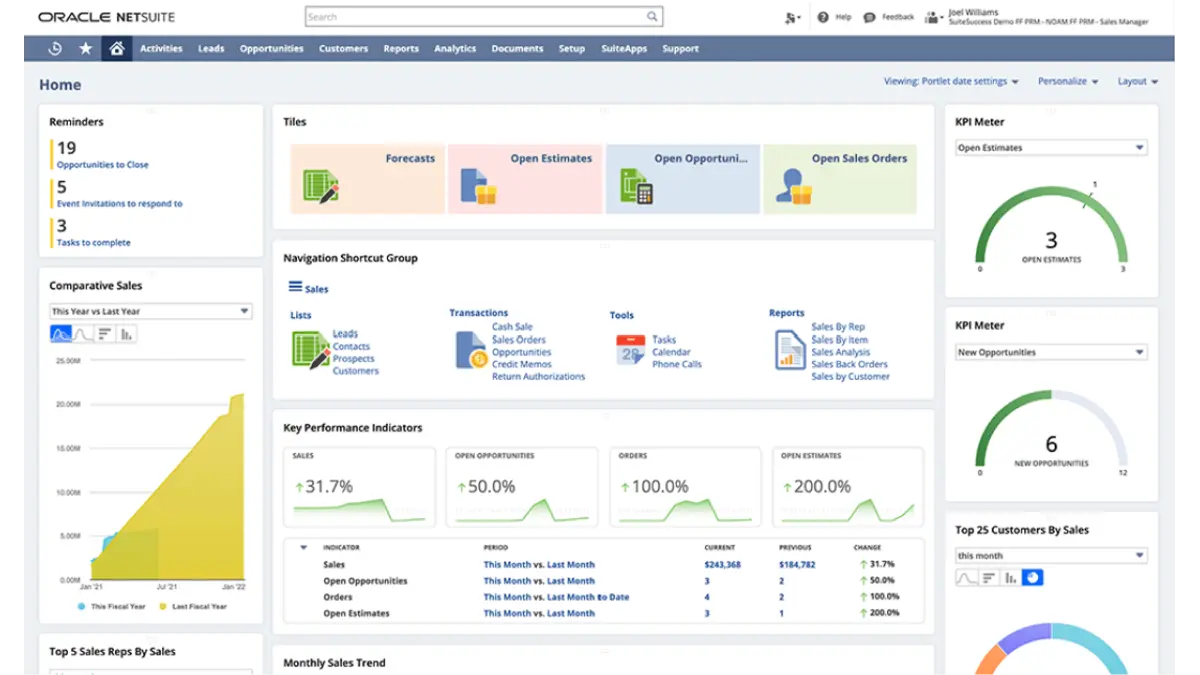
Oracle NetSuite is a leading cloud-based enterprise resource planning (ERP) software that provides a unified platform to manage business processes across various departments.
NetSuite integrates financials, customer relationship management (CRM), inventory management, human resources, and e-commerce in a single, scalable system. It’s designed to support growing businesses and enterprises by offering real-time data visibility and operational efficiency.
Key features:
- Financial management: Comprehensive financial planning, accounting, and revenue management.
- CRM: Advanced customer relationship management with sales force automation and marketing capabilities.
- Inventory and order management: Real-time inventory tracking, order management, and fulfilment.
- E-commerce: Integrated e-commerce platform supporting multiple sales channels and online payment processing.
- Human capital management: Employee records, payroll, talent management, and workforce analytics.
- Project management: Project tracking, resource management, and project accounting.
Supply chain management: Procurement, demand planning, and supplier management.
Strengths:
- Comprehensive integration: Seamless integration of various business functions into one platform, enhancing efficiency and reducing data silos.
- Scalability: Ideal for growing businesses, NetSuite can scale with increasing demands and complexity.
- Real-time data: Provides real-time visibility into business performance, enabling informed decision-making.
- Global reach: Supports global business operations with multi-currency, multi-language, and multi-subsidiary capabilities.
Weaknesses:
- High cost: The total cost of ownership can be high, especially for small to medium-sized enterprises.
- Complex implementation: Deployment and customization can be complex and time-consuming, often requiring professional services.
- User interface: Some users find the interface to be less intuitive and in need of modernization.
- Customer support: Mixed reviews on customer support, with some users experiencing delays and insufficient assistance.
4. Microsoft Dynamics 365
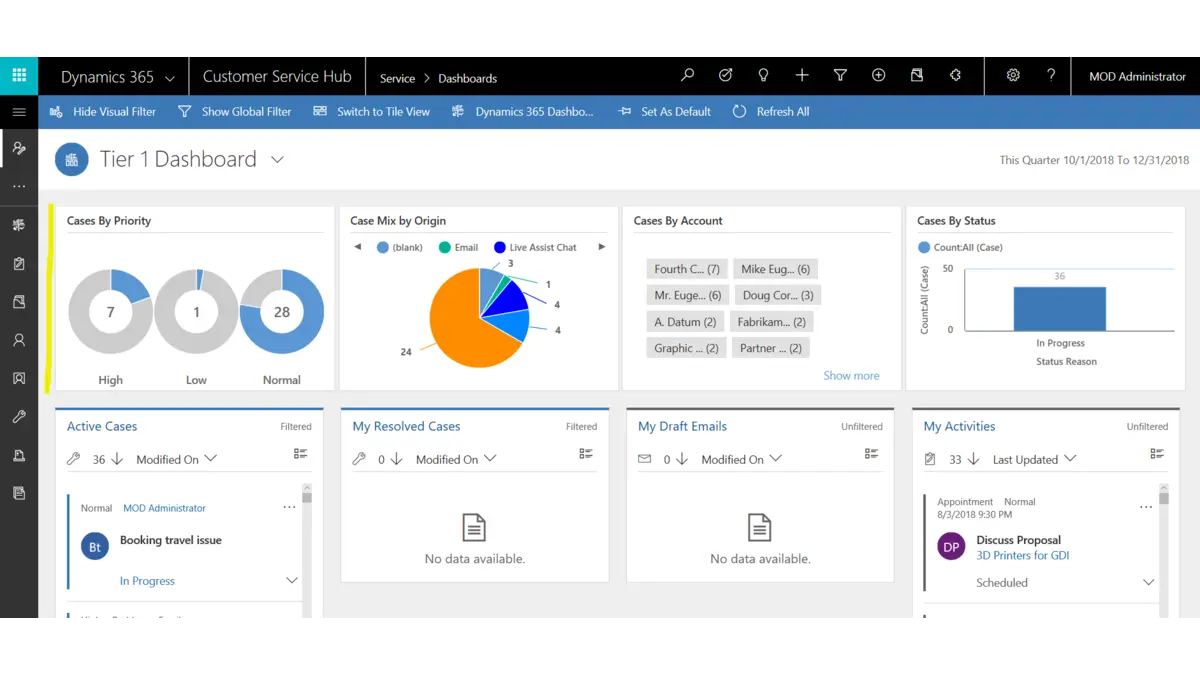
Microsoft Dynamics 365 is a cloud-based suite of enterprise resource planning (ERP) and customer relationship management (CRM) applications. It integrates various business functions such as sales, customer service, finance, operations, and human resources.
Leveraging the power of Microsoft’s cloud platform, Dynamics 365 offers robust analytics, AI capabilities, and seamless integration with other Microsoft products like Office 365 and Azure.
Key features:
- Sales and marketing: Comprehensive sales automation, customer engagement tools, and marketing campaign management.
- Finance and operations: Financial management, budgeting, and operational workflow automation.
- Human resources: Talent management, employee onboarding, and payroll processing.
- Field service: Resource scheduling, work order management, and mobile access for field technicians.
- Supply chain management: Inventory tracking, procurement, and logistics management.
- Commerce: Retail and e-commerce solutions with integrated POS systems.
Strengths:
- Comprehensive solution: Offers a wide range of integrated applications covering all business functions.
- Scalability: Highly scalable to meet the needs of small businesses to large enterprises.
- Advanced analytics: Robust AI and machine learning tools for predictive analytics and business insights.
- Seamless integration: Strong integration capabilities with Microsoft’s ecosystem, enhancing productivity and collaboration.
Weaknesses:
- Cost: This can be expensive, especially for small businesses or when implementing multiple modules.
- Complexity: The broad range of features and customization options can lead to a steep learning curve.
- Implementation time: Deployment can be time-consuming and may require significant planning and resources.
- Performance issues: Some users report occasional performance issues, particularly with complex data processes.
5. Sage 200
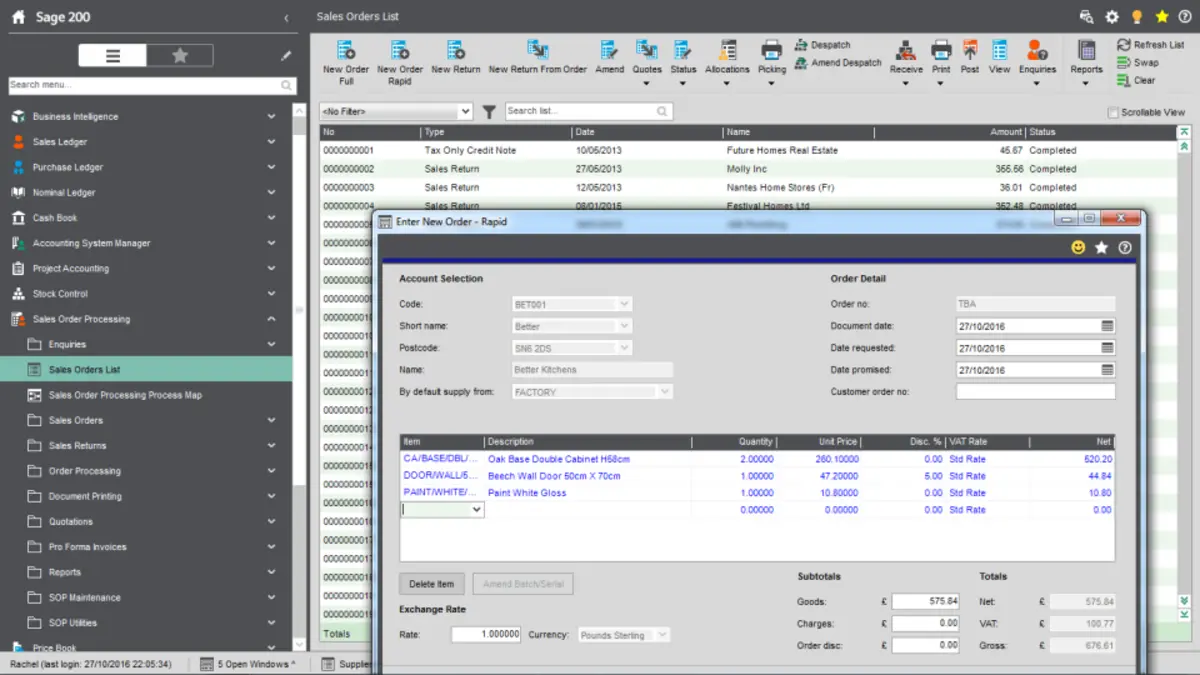
Sage 200 is a robust business management solution designed for small to medium-sized enterprises. It integrates various aspects of business operations, including accounting, financial management, supply chain, and customer relationship management (CRM).
This software offers both cloud and on-premise deployment options, providing flexibility and scalability to meet the evolving needs of growing businesses.
Key features:
- Financial management: Comprehensive financial controls, real-time reporting, and multi-currency support.
- Supply chain management: Inventory tracking, order processing, and supplier management.
- Project accounting: Detailed project tracking, budgeting, and cost management.
- Customer relationship management (CRM): Sales pipeline management, customer insights, and marketing automation.
- Sales Order Processing: Automated sales order processing and customer history tracking.
- Manufacturing: Bill of Materials (BoM), production scheduling, and shop floor control.
Strengths:
- Scalability: Offers a scalable solution that can grow with your business, making it suitable for both small and medium-sized enterprises.
- User-friendly interface: An intuitive and customizable interface improves user experience and efficiency.
- Comprehensive functionality: Integrates a wide range of business processes into one platform, reducing the need for multiple systems.
- Strong financial capabilities: Provides robust financial management tools with real-time insights and advanced reporting.
Weaknesses:
- Complex implementation: The initial setup can be complex and may require professional assistance to integrate fully.
- Cost: While offering extensive features, the cost can be high, especially for smaller businesses or those requiring extensive customization.
- Learning curve: Some users report a steep learning curve, particularly for advanced features and customizations.
- Limited customization: Compared to some competitors, there may be limitations in customizing the software to specific business needs.
Find more enterprise software provider options for you to choose from in our other article about the ERP software.
How to Choose The Right Enterprise Software for Your Business
Choosing the right enterprise software for your business can be a critical decision that impacts your company’s efficiency, productivity, and growth. Here are key steps and considerations to help you make an informed choice:
- Identify your business needs: Start by understanding your business’s specific needs. List the problems you aim to solve and the processes you want to improve. For example, are you looking for real estate contract software to streamline contract management, improve customer relationship management, or enhance financial and supply chain operations?
- Define your budget: Determine how much you are willing to invest in enterprise software. Consider not just the initial purchase price but also ongoing costs like maintenance, upgrades, and training. Keep in mind that investing in the right software can lead to long-term savings.
- Evaluate features and functionality: Look for software that offers features and functionalities that match your business requirements. Prioritize features that are critical to your operations and consider how the software can adapt to future needs.
- Consider integration capabilities: Ensure that the software can integrate seamlessly with your existing systems and tools. This is crucial for maintaining data consistency and avoiding disruptions in your business processes.
- Scalability and flexibility: Choose software that can grow with your business. It should be flexible enough to adapt to changes in your operations, whether that means adding new users, expanding to new locations, or incorporating new functionalities.
- User-friendly interface: A user-friendly interface can significantly impact user adoption and productivity. Opt for software that is intuitive and easy to navigate, minimizing your employees’ learning curve.
- Check vendor reputation and support: Research the reputation of the software vendor. Read reviews and testimonials to gauge user satisfaction. Additionally, ensure that the vendor provides robust customer support and training resources.
- Request a demo or trial: Most vendors offer a demo or free trial period. Use this opportunity to test the software in a real-world scenario. Involve key stakeholders and end-users in the evaluation process to gather comprehensive feedback.
- Assess security and compliance: Ensure that the software meets your security standards and complies with relevant regulations. This is particularly important if you handle sensitive data or operate in a regulated industry.
- Seek expert advice: If needed, consult with an IT expert or a consultant who can provide an unbiased opinion and help you navigate the complexities of choosing the right software.
By following these steps, you can make an informed decision that will support your business’s growth and efficiency.
Conclusion
Understanding what an ERP system is and the essential modules it should encompass is vital for any business looking to enhance efficiency and streamline operations.
With numerous ERP software providers available, it’s crucial to evaluate each option based on your specific business needs, scalability, and integration capabilities. Among the top contenders, HashMicro stands out with its comprehensive and customizable ERP solutions that cater to various industries.
HashMicro’s ERP software integrates all critical business functions, offering robust features that ensure seamless operations and data-driven decision-making.
To experience the transformative potential of HashMicro’s ERP system, we highly recommend trying their free demo. Discover firsthand how HashMicro can optimize your business processes and support your growth journey.
FAQ about Enterprise Software
-
What are the common challenges faced when implementing enterprise software?
Implementing enterprise software can be complex and fraught with challenges. Common issues include data migration problems, where transferring data from old systems to new ones may cause disruptions or data loss.
Additionally, there is often resistance to change from employees who are accustomed to the old system. Integration with existing systems can also be difficult, requiring significant customization and technical expertise.
Ensuring data security and compliance with local regulations adds another layer of complexity.
-
How does enterprise software improve business processes?
Enterprise software enhances business processes by automating repetitive tasks, improving data accuracy, and providing real-time analytics. This leads to better decision-making and increased efficiency.
For example, ERP systems can streamline inventory management, reduce the chances of overstock or stockouts, and improve financial reporting accuracy, making compliance with regulatory requirements easier.
-
What role does AI play in enterprise software?
Artificial Intelligence (AI) is increasingly integrated into enterprise software to enhance functionalities such as predictive analytics, process automation, and decision support.
AI can analyze large datasets to identify trends and anomalies, automate routine tasks like customer service inquiries through chatbots, and optimize supply chain operations by predicting demand and managing inventory levels efficiently.
-
How important is user training and support for enterprise software adoption?
User training and support are critical for the successful adoption of enterprise software. Proper training ensures that employees can effectively use the new system, minimizing disruptions to business operations.
Continuous support helps address any issues that arise post-implementation, ensuring smooth operation.
Comprehensive training programs and readily available support resources can significantly reduce the resistance to change and increase user confidence in the new system.
-
What are the key considerations for enterprise software scalability?
When evaluating enterprise software scalability, consider the software’s ability to handle increasing data volumes and user loads without performance degradation. Look for modular architecture that allows for adding new functionalities as needed.
Cloud-based solutions often provide better scalability, as they can leverage distributed computing resources. Additionally, ensure the software can integrate seamlessly with other systems to support future growth and technological advancements.






